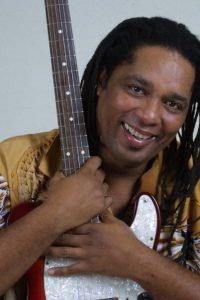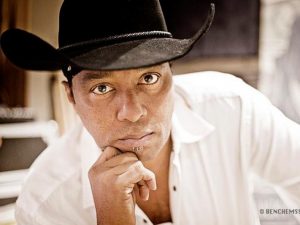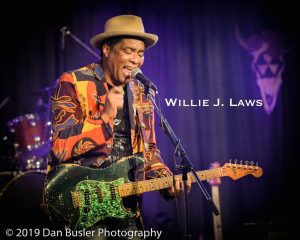Blues guitarist-vocalist Willie J. Laws Jr. had just returned from performing a string of dates in his home state of Texas when he talked about the latest happenings of his Willie J. Laws Band. His recent activities have included hiring St. Petersburg, Russia native Ksenia Vasileva to fill out the low end notes as well as a fund raiser last fall to help his drummer Osi Brathwaite pay for costs associated with a diagnosis of Sarcoidosis
“I’m working., getting a lot of bookings, looking forward to doing a lot of things here in New England this summer,” Laws said. “I just got back from home. I was down in McAllen, Texas, which is close to where I grew up, which is a stones’ throw from Mexico. You can imagine with all that’s going on down there it’s pretty interesting. It’s not what anybody would think it is, and it’s definitely not what’s being reported, and it’s definitely not what Mr. Trump is talking about either.”
Laws feels too many people believe what they are being spoon fed by the news media and the politicians who speak to the public through the media. The guitarist said that a quarter of the Texas-Mexico border area is a trade corridor that links that part of Mexico to the Central United states. Mexicans cross that border daily to shop at American side malls. “I don’t even want to get into that,” he said, getting frustrated with the topic.
Laws next reported on more local matters later in the interview. His drummer Brathwaite was able to stop taking one of his major medications he’s been on. A series of minor check ups and a more in-depth one in April should give him a better indication where he stands with that disease. “The Sarcoidosis also cause clots in the blood. Right now, he’s on blood thinners. He can’t fly anywhere because of the clots.” Laws revealed that last fall’s fundraiser held for Brathwaite was well attended and successful.
“The blues community here is awesome. I can’t say enough good things about the New England blues community,” he said. “They’ve been there for us. Thank you, always, everybody, from the bottom of my heart. If there’s ever anything that anyone ever needs, they can always reach out to me. If I’m available, I’ll do it, I’ll find a way to do it.”
On the topic of his latest bass player Ksenia Vasileva, Laws couldn’t stop praising her. She hails from St. Petersburg, Russia, and she is a classically trained pianist who only recently learned to play the bass guitar. “Blues, funk, R&B, just something about it, just did something to her. She started picking it up and learning. She’s a hot ticket over there in Russia and in Europe. Here, she’s just like the rest of us, man. Struggling, man, struggling to make that buck, struggling to see where that next pot of beans is coming from.”
Between Vasileva’s Russian history and Laws’ own history of touring Russian cities, he could easily end up doing some serious tours there once the current political climate thaws out . Laws once worked with the United States State Department to perform at cultural exchange events overseas. He already has a vision for playing hot music in that cold country.
“Siberia is really cool, believe it or not,” the guitarist said. “Siberia is happening. I like Siberia, St. Petersburg, Moscow, and maybe couple of places in between.”
Laws’ concern about traveling to Europe and a Slavic country is that foreigner bookers and foreign venue owner want to play less money nowadays for American acts. Laws said the bands have put themselves in this position by accepting less money for the experience of playing abroad.
“They think we can get any American band for three hundred Euros,” the guitarist said. “Learn your worth. Learn some pride, man. That gets under my skin because it makes it bad for all of us.” Laws explained that American bands think performing in Europe is a holy grail place to perform. The blues man feels that it’s not a big deal to tour in Europe as he’s been performing gigs there since 1985.
“The money has gone down because of these (bands),” he said. “They want to offer me less when I go. That’s why I don’t even go over there any more. It’s not even worth it. Dumb asses over here are playing for $50 and a beer. I’m going off now. It makes it hard for me to make a living.”
Laws switched to a more positive note, discussing the success he’s had with his latest CD, Black Maria. He’s proud of a pleasant CD Review he received from Bruce Iglauer from Alligator Records. Laws has never been expecting to be accepted as an artist on that label because he has never written in that style. “I’ve always valued Bruce’s advice and guidance,” Laws said. “I send him stuff. He reviewed it very favorably. I sent one to Living Blues, I haven’t heard anything back yet.”
The title track to Laws’ Black Maria CD is a reference to police paddy wagons that could carry many arrested suspects at once. In the Texas area those paddy wagons are termed “Black Maria.” In the north east, paddy wagons are called Black Mariah.
“It looks like some kind of futuristic Nazi war wagon. I don’t think you want to be caught up in that thing,” Laws said. “The old guys listening to them about how they might be walking down the street around San Antonio, or even Huston, Dallas, where ever. Cops would just harass them, pick them up, beat them up, throw them in the Black Maria. If you survived it, they’d throw your ass out, then you try to walk home, crawl home, do the best you can to get home. Just be thankful you was alive.”
Laws pointed out that the first Paddy Wagon was created in Boston, Massachusetts. In the early 1800s there were old prison wagons, horse drawn, mule drawn. Laws referred to a persistent urban legend that is not well documented:
“I think it might have been named after this unusually large black woman that was here in Boston during those times,” Laws said. “If people were getting too unruly, the cops would go get her to straighten shit out. I believe that is the story. I do know that the Black Mariah was invented here in Boston. That’s a fact.” Since that time, police stations around the world have used a form of “Black Mariah” to transport numerous prisoners at once.
Laws is actually geared up to begin preproduction on another album for his Willie J. Laws Band. He says the download trend has made it difficult for him to sell physical copies of his CD. “No one’s making the money they used to make, that’s for damn sure. I mean, someone is, but it ain’t trickling down to us second tier acts. Pretty much the top tier acts are starting to compete for the same places that we play for. Honestly, I really don’t know what’s going on with the music business.”
Like most musicians, Laws finds his creative desires frustrated as there are many barriers but especially the financial ones. It cost him money to create musical products. He has to pay for musicians, travel expenses, maintaining equipment, rent, and groceries.
“It’s not easy being an artist,” he said. Laws believes that clubs, labels, others should develop a following for their clubs and labels by developing a reputation for offering the best possible artists. That, he believes, makes more sense than labels and clubs cultivating fewer artists to carry their bottom line for them.
“That’s putting a lot of responsibility on one band, building up their fan base,” he said. “(The artists) have to make their own machine and then sell their machine to a bigger machine to help the parts that that big machine has (eroded) over the decades. That’s just the way I feel.”
Laws, who grew up in the 1970s, said he remembers when “music was really good, you turned on the radio and it hardly ever sucked. It didn’t matter who it was. It could be blues. It could be rock and roll.. It could be rhythm and blues. It could be whatever.”
Laws came into the music scene after the times of white only clubs in which blacks could only perform but never attend. Yet, despite growing up in a post-Civil Rights bill world, he feels a racist mind set impacted him before he was born. “Not just music but everything. A racist mind set impacts us all. It doesn’t matter where that mind set comes from. It doesn’t matter if the skin that that mind set is wrapped in. It could be a black person that’s racist. It could be a white person that’s racist. It’s a racist mind set, period. It’s a human problem I don’t think it’s like a specific race problem. We’re all racists.” Laws was referring to the prejudices that all humans carry with them.
“We all do,” he said. “I don’t know where it comes from. We all have it and have had it and probably will continue to have it after we are long gone off this earth. The truth is, how do you deal with it? How does one turn that poison into medicine? That’s the trick.” Laws does not recall ever being turned down for a gig based on his race. He’s also never turned one down because of his own prejudices.
“I don’t care about that shit, honestly,” he said. “I do my best not to care unless it starts to get really physical and really ugly and somebody’s going to get hurt. Then, my caring kicks in. But other than that, words and all that shit and infighting and all that. I try to let all that just roll off my back.”
Laws does not know why he might have been turned down for gigs in the past. Those things don’t matter to him “If it’s a place I want to get into really bad, I’ll get in there. I’ll figure out a way to get in there. I’m a disabled veteran, so I’m not kissing nobody’s ass for nothing. I don’t have to. I put on the uniform, served this country, and got hurt doing it. So, I ain’t kissing no mother fucker’s ass around here. That ain’t happening. I’ll work with you, and we’ll make money together, but I’m not kissing nobody’s ass to get ahead.”
Much of Laws’ musical influence, aside from Texas blues and old school R&B, comes from the Tejano-Conjunto music that was cultivated by Mexican-American workers, a form of music is indigenous to that area. This was a time when farming was their major source of income. Many of those farmers used to work with black farm workers.
“This is like 30s, 40s,” he said. “The music really started to take shape in the late 1920s and 30s. Being exposed to that as well as R&B, country, Cajun and Zydeco, I’m very fortunate to grow up in that region.”
Laws has been for years referring to himself as The Last Prophet Of The Funky Texas Blues, which is the title of a song his Black Maria album. Laws’ idea for it started to evolve after he heard a Texas DJ announce his idol Freddie King as the last prophet of blues known today.
“Freddie was taking the blues and he started to inject funk into it and he was starting to inject other elements into it, towards the end. I want to pick up where he left off and still represent that state of Texas through the Texas music contributions to the fabric of this country.”
“I think I just gave myself that moniker in a moment of egotistical regalia,” Laws said. From this point on Laws said he’d like to move his career and music forward. “As long as I’m alive and I can keep doing it, I just want to keep going forward,” he said.
Laws will be working with Roberto Morbioli in April and May and in August and September. Shows will take place at The Bull Run in Shirley, Massachusetts and at The Knickerbockers Café in Westerly, Rhode Island. Laws has tentative plans to return to Texas and hopes to also get into Mexico and Jamaica.
https://www.facebook.com/WillieJLawsBand/









